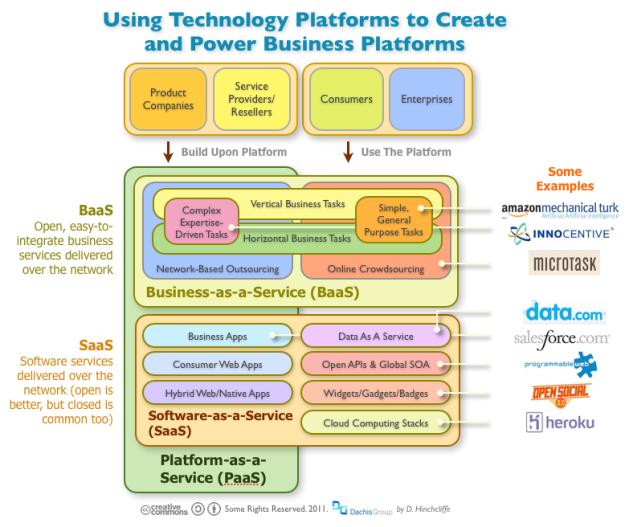Are We Building Businesses? Or Are We Building Platforms? Yes.
October 18, 2011 5 Comments
A couple of days ago I saw a tweet go by from Michael Cote, referencing some work I did a few years back that tried to articulate the full notion of where Platform-as-a-Service (PaaS) was going. I had been exploring the subject as Google and Amazon had recently been busy expanding their offerings in the space.
I was struck by how well the early depiction held up, given the evolution of the industry since then, including the arrival of new innovative players at the time (Heroku and CloudFoundry) and the struggles of some of the originals (Bungee). I wouldn’t add or change much about the breakdown, other than to update it around the edges and add some examples:
But as I looked at this, it also occurred to me — as our focus much of the time in business these days is about strategies to deal effectively with the latest disruptive tech — that it’s up to us to have an abundantly clear vision of the big picture of what we’re actually aiming for as a whole. This is particularly true now since the choices we make today on how we build and evolve our businesses will either lead us to 1) break out of the box and thrive or 2) just make incremental improvements that are unlikely to propel us towards a sustainable and successful future.
Key to this discussion is this question: Are we building businesses? Or are we building platforms? Of course the answer to both is yes, but most of us still possess a very 20th century notion of what a business is.
We think of business in very solitary, disconnected terms, where partners can’t rapidly connect with us and integrate their supply chains, where we can’t even readily reuse and build upon what we have ourselves, and most of our data and systems are closed off from us and each other. Unfortunately, we now live in a new time and this is no longer an option. Those days are definitively over. Steve Yegge’s epic and widely discussed rant recently about how Google doesn’t get platforms (and how Amazon does), shows the new chess board that next-generation enterprises must be playing on:
That one last thing that Google doesn’t do well is Platforms. We don’t understand platforms. We don’t “get” platforms. Some of you do, but you are the minority. This has become painfully clear to me over the past six years. I was kind of hoping that competitive pressure from Microsoft and Amazon and more recently Facebook would make us wake up collectively and start doing universal services. Not in some sort of ad-hoc, half-assed way, but in more or less the same way Amazon did it: all at once, for real, no cheating, and treating it as our top priority from now on.
But no. No, it’s like our tenth or eleventh priority. Or fifteenth, I don’t know. It’s pretty low. There are a few teams who treat the idea very seriously, but most teams either don’t think about it all, ever, or only a small percentage of them think about it in a very small way.
It’s a big stretch even to get most teams to offer a stubby service to get programmatic access to their data and computations. Most of them think they’re building products. And a stubby service is a pretty pathetic service. Go back and look at that partial list of learnings from Amazon, and tell me which ones Stubby gives you out of the box. As far as I’m concerned, it’s none of them. Stubby’s great, but it’s like parts when you need a car.
A product is useless without a platform, or more precisely and accurately, a platform-less product will always be replaced by an equivalent platform-ized product.
It’s this last sentence that’s the clicher:
A platform beats a product every time.
In our deeply connected, social, mobile, cloudy, consumerized, and data-driven world, that’s what we must be creating, whether you’re a Fortune 500 company or an Internet startup. Only those with a clue about this will survive the 21st century for very long. Getting there requires real discipline, no cheating (read about Jeff Bezo’s mandate in Yegge’s post above), and minimal compromise. It must be a top organizational priority, especially if you’re a large organization and/or you control large, strategic data sets.
Unfortunately, outside of the Web community, most companies don’t understand how to platform their business, or the urgency. But do it they must if they expect to compete with the new wave of digital native enterprises that will otherwise eat their lunch. Otherwise expect to be run over by Amazon, Facebook, and Apple, and a new generation of platform companies that get it.
For a deeper discussion, please read the “Big Five” IT shifts today, and the 10 strategies I recommend to deal with them and for a detailed exploration of the specific technology and adoption challenges in particular. For specifics on how to platform your business, I recommend Running Your SOA Like a Web Startup and Open APIs Mature Into A Next-Generation Business Model.




























































Totally agree with you … Unfortunately building a platform is not a core “business” objective. Why? because it is considered as an IT issue (and it’s not obviously) and because it requires a long term investment that no no corporate finance dept will accept.
Without Open API, good data quality and a platform, it is becoming extremely hard to benefit from the new networked business world.
If you do not master your platform, then you also become dependent from one of your supplier and that’s a big issue…
Finally, we miss great people able to explain, design and build platforms … Education is key …
PS: I do like your drawings …
Pingback: This Week: Content is Fueling e-Commerce + Time for a CXM Audit?
Pingback: This Week: Content is Fueling e-Commerce + Time for a CXM Audit? | CMS News Today
Pingback: Why the world needs a new tax system for the digital age | VentureBeat
Pingback: Articles of Interest – August 18, 2017 « National Creativity Network